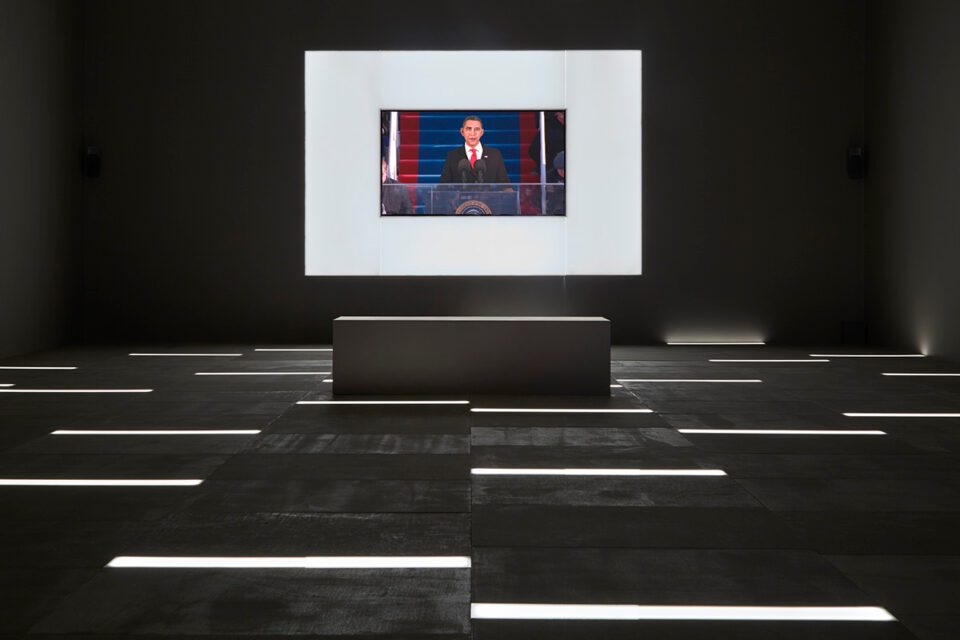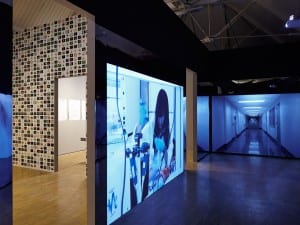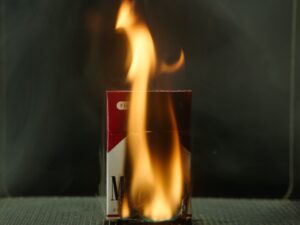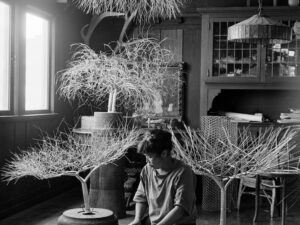Upon entering Freedom, the visitor is first greeted by the smell of sugar mixed with congealing pig’s blood. This is not an exhibition designed to hold the viewer’s hand: the windows are boarded up and the walls are lined with doughnuts constructed from various materials, including dollar bills, bullets and razor blades encased in crystal resin. The artist rarely discusses his work, insisting that the art speaks for itself, and that it does: the “police as pigs” allusion is not an especially difficult conclusion to draw from the doughnut display, although perhaps this is the cause of the show’s triumph. A common criticism of contemporary art is that it is impermeable, elitist and obscure, whereas Kline’s intended meaning is unashamedly plain. Entering a small alcove, a film is being shown on a loop; the faces of politicians responsible for the Iraq War: Donald Rumsfeld, Tony Blair et al, are superimposed onto actors who are weeping and begging forgiveness. The effect is uncomfortable and infuriating.
On entering the second room, the viewer is received by four imposing six-foot mannequins, garbed in police attire and topped with Telletuby heads. Videos are projected on parallel walls, one of a modified version of Barack Obama’s inaugural speech, criticising political capriciousness and profiteering. The other, Patriot Acts is an amalgam of heroic American imagery, drawn from the logo for the American National Security Agency, designed to provoke the very opposite of patriotism. The Telletuby’s bellies are complete with tablets each playing Privacy, a video in which police officers read aloud from scripts drawn from the social media accounts of political activists. The entire environment, complete with surveillance trees hung with credit cards for leaves is of a disturbing dystopia. Though the semantics of the exhibition are distinctly American, the clarity of their symbolism is both disconcerting and revealing to the point of ill-advised political self-righteousness.
However, though many of the exhibition’s connotations are mirrored in our society, others pose a slightly greater challenge for the UK audience, the show having first been exhibited in New Museum, New York, earlier this year as part of Surround Audience, the museum’s third triennial exhibition showcasing young artists in dialogue with the future of culture. The interior of the menacing Telletubyland is modelled on Zuccotti Park; formerly Liberty Plaza Park, undoubtedly one of the motivations for the show’s name, occupied by protesters during the Occupy Wall Street demonstrations of 2011. Though images such as the camp in Manhattan’s financial district may not be second nature to us, the principles of the movement were certainly felt and copied abroad, as was the universal disgust towards economic corruption, inequality and greed. Although the exhibition is not obviously terrifying, the conclusions that it leaps to do inspire pause for horrifying thought. Kline’s superimpositions; Condoleeza Rice’s teary apologies and toddler’s TV characters fixed onto special forces uniforms, represent the televisual manipulations with which the contemporary audience is unendingly mollycoddled, or at least that is the artist’s intention.
Whilst the show might be criticised for its scaremongering agenda, of which the media which Kline derogates is equally guilty, this is an art practice which is unforgiving, thought provoking and necessary, especially for a generation of people entering the current politico-economic purgatory. As Kline’s own artist statement reads: “Reared in this anti-privacy crèche and raised on a diet of poverty media fermented from aphasic dreams, the world’s newest voters remain hopeful seekers. If the ballot box fails them, they go viral.” The practice of political critique is sorely absent from contemporary art, but perhaps it is safe to assume that the fashion for formalist installation might be losing its relevance, and being replaced instead with an art that addresses life as it is being lived at the present, which as Kline demonstrates, is no walk in the park.
Josh Kline: Freedom at Modern Art Oxford until 18 October 2015. For more information, visit www.modernartoxford.org.uk.
Laura Catsellis
Follow us on Twitter @AestheticaMag for the latest news in contemporary art and culture.
Credits
1. Josh Kline, Hope and Change, 2015. Courtesy of Modern Art Oxford and Ben Westoby.





